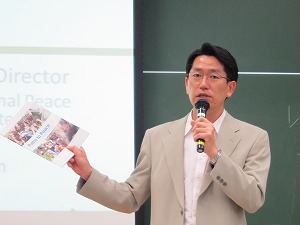On June 8, 2011, Mr. Yasuaki Aihara, Deputy Director of Secretariat of the International Peace Cooperation Headquarters, Cabinet Office, delivered a lecture, “UNPKO and Japan’s International Peace Cooperation”.
In Part One, as an introduction, he reviewed the historical changes in the nature of world conflicts. Points mentioned were: since mid-1970s and particularly after the end of the Cold War, more intrastate conflicts than interstate conflicts occurred; conflicts often occur in Africa and Asia; various players are involved in recent conflicts; and causes of conflicts have become more complex.
Secondly, he talked about the history and the characteristics of UNPKO. Legal basis, basic functions, and emergence of multi-functional and robust PKO were covered. Also, the nature of UNPKO was discussed in relation to various concepts related to peace, namely, conflict prevention, peacemaking, peace enforcement, peacekeeping, and post-conflict peacebuilding. Then he presented a model structure of UNPKO mission and stated the relationship between Military, Police, and Civilian Sections, as well as coordination between UNPKO and UN Country Team. He further elaborated on how different actors cover various post-conflict tasks and functions of UN Organizations, WB/IMF, NGOs and UNPKO were discussed. He remarked on contribution of personnel by member countries to UNPKO, and stated that contribution of personnel by Japan was not so large, regardless of its high budget contribution to UNPKO. He added that because of the recent expansion both in functions and in size, securing resources has become a serious problem.
Thirdly, Japan’s international peace cooperation was examined.
He elaborated on the chronology of Japan’s cooperation, approval of PKO law in 1992 and “Five Principles”, three types of cooperation (UNPKO, International Humanitarian Relief Operations, and International Election Observation Operations) two tools of cooperation (Dispatch of Personnel, and Contribution in Kind). He also talked about the work flow, structure and function of the International Peace Cooperation Headquarters, and favorable response of international community to Japan’s cooperation. He briefly introduced liaison and coordination work in Haiti which he performed in March 2010.
Finally in Part Two, spending few minutes, he introduced his background and personal experience in international cooperation, noted some points and encouraged the students.
(Yukihiko Masuda)



